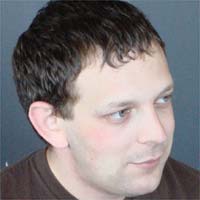Workshop on QUANTUM INFORMATION PROCESSING AND QUANTUM COMMUNICATIONS
Miniworkshop on Quantum Foils
Unentangled Bit Commitment and the CBH Theorem
>VITAE:
Matt Leifer completed his Ph.D. at the University of Bristol in 2003 under
the supervision of Prof. Noah Linden (Title: Entangled Quantum Dynamics).
From 2004-2006 he was a postdoc at the Perimeter Institute for Theoretical
Physics and after a brief stint at the University of Cambridge he began
a second postdoc at the University of Waterloo in 2007. Research interests
include: Foundations of Quantum Theory, Quantum Bayesianism, Algorithms
for simulating many-body quantum systems and Entanglement theory.

After briefly reviewing the convex sets framework, I will show that an exponentially secure bit commitment protocol exists in any theory within the framework that does not permit entangled states [1]. Combined with our earlier results on broadcasting [2], this provides a complete generalization of the theorem proved by Clifton, Bub and Halvorson that was aimed at characterizing quantum theory in terms of information theoretic constraints [3]. Their theorem was proved in the context of C*-algebraic theories, but unfortunately in the more general context of convex sets, the same axioms do not imply anything particularly close to quantum theory. If time permits, I will discuss a conjecture about the set of theories that do not permit bit commitment.
[1] H. Barnum, O. Dahlsten, M. Leifer
and B. Toner, Nonclassicality without entanglement enables bit commitment
(2007), submitted to IEEE Information Theory Workshop 2008, arXiv version
to appear soon.
[2] H. Barnum, J. Barrett, M. Leifer and
A. Wilce, Generalized No-Broadcasting Theorem (2007), to appear in Phys.
Rev. Lett., arXiv:0707.0620
[3] R. Clifton, J. Bub and H. Halvorson,
Characterizing quantum theory in terms of information-theoretic constraints,
Foundations of Physics 33, 1561-1591 (2003), arXiv:quant-ph/0211089v2